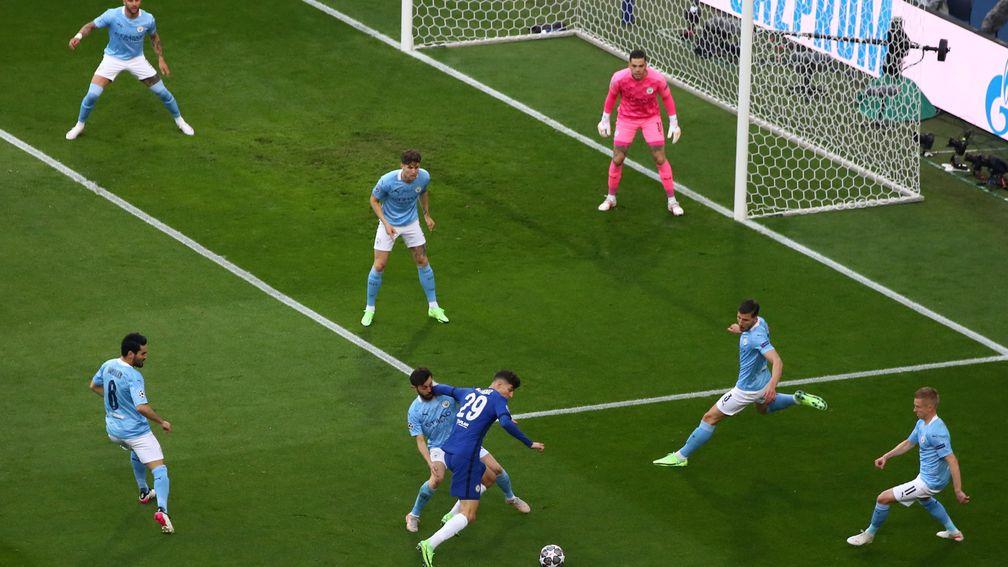This is what normally separates winners from losers in the Champions League
The Soccer Boffin's weekly dose of betting wisdom

Five minutes. Where it can do the most good. The difference between the best and the worst in the Champions League.
There is more than one way of playing football. You can have a lot of the ball and lose, you can have little of the ball and win. Generally speaking, though, successful teams have more possession than unsuccessful teams.
In the Champions League over the last eight completed seasons – 2014-15 to 2021-22 – teams knocked out in the group stage averaged 46 per cent possession, teams knocked out in the round of 16 averaged 50 per cent possession and teams who reached the quarter-finals or beyond averaged 54 per cent possession.
An old chestnut that gets thrown into these debates is that a team could get a lot of possession by passing the ball around in their own half. They could, but usually they do not.
Good teams tend to have more possession than bad teams, and the extra tends to be in places where it is most dangerous – ever closer to the opposition goal.
Divide the pitch into three parts and call them the defensive, middle and attacking thirds. Teams knocked out in the group stage spent 14 per cent of matches with the ball in their defensive third. So did teams knocked out in the round of 16. And so did teams who reached the quarter-finals or further.
The differences were in more advanced areas.
Teams knocked out in the group stage spent 24 per cent of matches with the ball in the middle third. For teams knocked out in the round of 16 the proportion rose to 26 per cent, and for teams who reached the quarter-finals or beyond it rose to 28 per cent.
And there were increases at the top end too. Teams knocked out in the group stage spent eight per cent of matches with the ball in their attacking third. For teams knocked out in the round of 16 the proportion rose to ten per cent, and for teams who reached the quarter-finals or further it rose to 12 per cent.
As teams got better they spent more time with the ball in better places. We can see this in another way if we look at one team across several seasons: Chelsea.
In the four seasons 2014-15, 2015-16, 2017-18 and 2019-20 Chelsea went out in the round of 16. They averaged 50 per cent possession – 13 per cent in their defensive third, 26 per cent in the middle third and 11 per cent in their attacking third.
Two seasons ago Chelsea won the Champions League and last season they were narrowly beaten in the quarter-finals. Across those campaigns they averaged 56 per cent possession – 13 per cent in their defensive third, the same as before, but increases to 29 per cent in the middle third and 14 per cent in their attacking third. More possession in better areas led to better results. On Wednesday Chelsea sacked the manager who supervised most of them.
We can define different stages of the Champions League like this. Teams who contest the quarter-finals are the best eight, teams who go out in the round of 16 are the next-best eight, teams knocked out in the group stage are the worst 16.
The best teams typically kept eight per cent more possession than the worst teams – four per cent more in the attacking third, four per cent more in the middle third, the same in the defensive third.
The average ball-in-play time in Champions League games (excluding any extra time) was 61 minutes. Eight per cent of 61 minutes is five minutes.

Not got a Paddy Power account? Sign up and get up to £50 in free sports bets
Place a single £10 Sportsbook bet and get money back as a free bet if it loses. There are x5 Free Bets available. Max refund per qualifying bet is £10. Only deposits made via Credit/Debit Card will be eligible for the promotion. Paddy's Rewards Club: Get a £10 free bet when you place 5x bets of £10+. T&Cs apply 18+ begambleaware.org
Today's top sports betting stories
Follow us on Twitter @racingpostsport
Published on 8 September 2022inKevin Pullein
Last updated 17:47, 8 September 2022
- Best Premier League summer transfers might not be who you think they are
- Kevin Pullein: How much will winning the title affect Liverpool?
- To discover how good Liverpool are we should consult the gods of ancient Egypt
- Adventurous play key to winning a fanless match | Thought for the week
- How much time-wasting is there in the Premier League and how can it affect bets?
- Best Premier League summer transfers might not be who you think they are
- Kevin Pullein: How much will winning the title affect Liverpool?
- To discover how good Liverpool are we should consult the gods of ancient Egypt
- Adventurous play key to winning a fanless match | Thought for the week
- How much time-wasting is there in the Premier League and how can it affect bets?